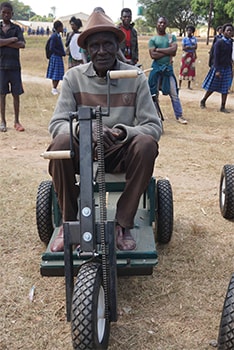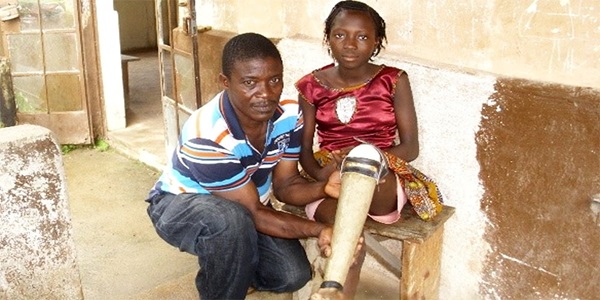Mobility is key to a person’s independence. The ability to go to market, get to the doctor, take the kids to school or travel to work can be daunting for people with physical challenges. While technical advances have helped people in Western countries gain independence, people in countless remote and rural areas across the world would find a wheelchair of little use on the rocky, unpaved terrain they might travel.
Addressing physical disabilities may mean providing new ways to travel or new prosthetic limbs for those who need them. Global Ministries meets the challenge of immobility in a variety of ways through Global Health initiatives, (Advance #3021770). Support for United Methodist health clinics and hospitals in rural areas may provide early diagnoses and treatments that ultimately prevent physical disability. But often these clinics operate in areas where the population has experienced trauma from violent conflict. Landmines, irreversible injuries, poor nutrition and poverty contribute to the permanent loss of mobility.

Global Health has partnered with the United Methodist Health Board in Sierra Leone and the United Methodist Prosthesis Center in Bo District to support a prosthesis initiative for amputees. The center supports those who have become amputees for a variety of reasons, including accidents, war and sickness.
Aminata Kargbo, from Shenge, lost her leg because of an accident traveling to Bo. Kargbo’s first thought was: “How can I live without my foot? I am a pupil and an athlete.”
While she still bears emotional and physical trauma symptoms, the center in Bo has given her hope. “I would like to continue my schooling and my athletics, but the pain was too much using a crutch. I try and put on a brave face among my friends, but soon, thanks to this project, I will have a prosthetic to help me. I have really been encouraged by this support and I am so grateful to donors because I can use this limb to go to school and do other things for myself.”
A second ministry receiving a Global Health grant this year is PET Zambia (www.petzambia.com), part of the New Life Center ministries of the UMC Zambia in Kitwe. A PET is a three-wheeled chair with wide, durable wheels, a cart and hand pedals to propel the device.
The PET project was started after the Rev. Larry Hills, a UMC missionary in the Congo, accidentally stepped on someone crawling through the fields. Hills pulled back the weeds to find a young woman with a baby on her back going about her daily chores. Hills worked with Mel West in Iowa and other friends in the U.S. to develop a PET prototype. The U.S. ministry, which is now called Mobility Worldwide, has expanded to 22 workshops in the U.S., making carts and then shipping them internationally to areas where they are needed.
Helping people to overcome the barriers that keep them from joining in daily activities of life can go a long way to restoring their independence and self-esteem. While finding people tucked away in their villages and even in larger cities may be difficult, Methodists connect in amazing ways to reach them.
excerpt from a story by Christie R. House, senior writer/editor for Global Ministries
The Advance is the accountable, designated-giving arm of The United Methodist Church. The Advance invites contributors to designate support for projects related to the General Board of Global Ministries. Individuals, local churches, organizations, districts and annual conferences may donate to The Advance. One hundred percent of every gift to The Advance goes to the project selected by the giver. Gifts to missionaries support the entire missionary community.





